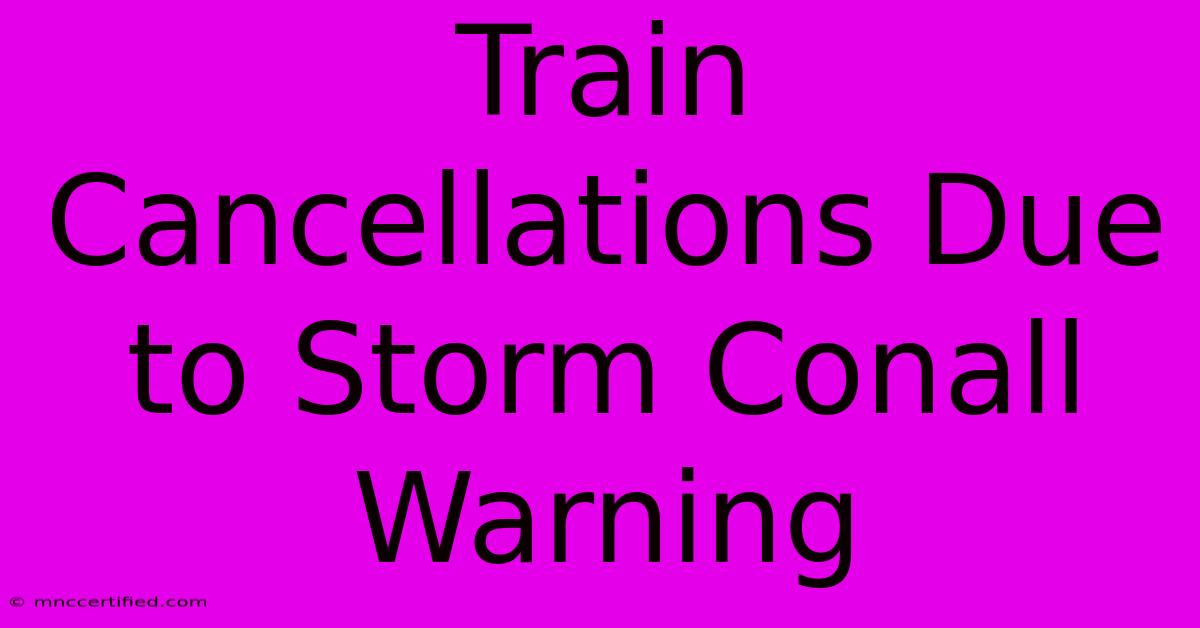Train Cancellations Due To Storm Conall Warning

Table of Contents
Train Cancellations Due to Storm Conall Warning: What You Need To Know
Storm Conall is brewing, and its impact on train services is already being felt across the country. Many rail operators are issuing warnings and announcing cancellations due to the severe weather conditions. This article provides crucial information and advice to help you navigate the disruption caused by Storm Conall.
Understanding the Risks of Storm Conall for Train Travel
Storm Conall presents several significant risks to train operations:
- High winds: Strong gusts can damage overhead power lines, causing widespread power failures and halting train services. Fallen trees and debris on the tracks also pose a serious threat.
- Heavy rain and flooding: Intense rainfall can lead to flooding on tracks, making them unsafe for trains to operate. Waterlogged ground can also cause landslips, further disrupting services.
- Safety concerns: Operating trains in severe weather conditions is dangerous for both passengers and staff. Rail operators prioritize safety and will often cancel services to prevent accidents.
Checking for Train Cancellations & Delays
Staying informed about disruptions is paramount. Here's how to check for cancellations and delays related to Storm Conall:
- National Rail Enquiries: This website (www.nationalrail.co.uk - replace with your country's equivalent if not UK based) is a central hub for real-time train information across the UK. Check here for the latest updates on delays and cancellations. Remember to specify your route and travel dates.
- Individual Rail Operator Websites: Check the websites of the specific rail companies operating on your route. Their websites usually provide more detailed information about their services and any disruptions affecting them.
- Train Station Displays: If you are at a station, check the electronic boards for real-time updates on your train's status.
- Mobile Apps: Many rail companies have mobile apps that provide real-time updates and allow you to receive notifications about delays and cancellations.
Pro Tip: Set up alerts on your chosen platform for your specific route to receive instant notifications of any changes.
What to Do if Your Train is Cancelled
If your train is cancelled due to Storm Conall, several options are available:
- Alternative Transport: Consider alternative transport options like buses, taxis, or ride-sharing services.
- Reschedule Your Journey: Contact your rail operator to reschedule your journey for a later date. Be prepared for potential delays in getting a new booking.
- Claim Compensation: Depending on the circumstances and your ticket type, you may be eligible for compensation for the cancelled train. Check your rail operator's terms and conditions regarding compensation for delays or cancellations.
- Seek Accommodation: If you're stranded and need overnight accommodation, inform your rail operator, as they may be able to assist with finding a hotel.
Preparing for Storm Conall & Future Travel Disruptions
Preparation is key to minimizing the impact of travel disruptions during severe weather:
- Monitor Weather Forecasts: Keep a close eye on weather forecasts in the days leading up to your journey.
- Pack Appropriately: Carry an umbrella, waterproof clothing, and extra layers if traveling during stormy conditions.
- Allow Extra Travel Time: Always allow extra time for your journey, especially during periods of severe weather. Unexpected delays are common.
- Have a Backup Plan: Always have a backup plan in place in case your train is cancelled or significantly delayed.
Staying Safe During Severe Weather
Your safety is paramount. Remember to:
- Avoid unnecessary travel: If possible, postpone your journey until the storm passes.
- Be aware of your surroundings: Be cautious near railway tracks and avoid flooded areas.
- Follow instructions from rail staff: Listen to and follow any instructions given by rail staff.
By following these tips and staying informed, you can minimize the disruption caused by Storm Conall and other severe weather events. Remember to check for updates regularly and prioritize your safety.

Thank you for visiting our website wich cover about Train Cancellations Due To Storm Conall Warning. We hope the information provided has been useful to you. Feel free to contact us if you have any questions or need further assistance. See you next time and dont miss to bookmark.
Featured Posts
-
London Storm Conall Flooding Warnings
Nov 28, 2024
-
Bond Street Social Restaurant
Nov 28, 2024
-
Crazy Crow Trading Post Photos
Nov 28, 2024
-
Live Updates Celtic Vs Club Brugge Ucl Match
Nov 28, 2024
-
1978 Elvis Trading Cards Value
Nov 28, 2024